Dance Dance Revolution (DDR) is a music video game series produced by Konami. Introduced in Japan in 1998 as part of the Bemani series, and released in North America and Europe in 1999, Dance Dance Revolution is the pioneering series of the rhythm and dance genre in video games. Players stand on a "dance platform" or stage and hit colored arrows laid out in a cross with their feet to musical and visual cues. Players are judged by how well they time their dance to the patterns presented to them and are allowed to choose more music to play to if they receive a passing score.
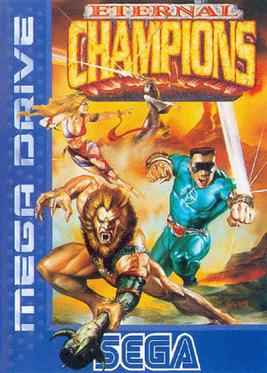
Eternal Champions is a 1993 fighting game developed and published by Sega for the Sega Genesis. It was one of the few fighting games of its time developed from the ground up as a home console title, rather than being released in arcades first and later ported to home systems.

Alex Kidd in Miracle World is a platform game for the Master System. It was released in Japan on November 1, 1986, followed by North America in December 1986, with Europe in September 1987, plus South Korea in October 1988, and Brazil in 1989. It was later built into many Master System and Master System II consoles. A remake by Merge Games and Jankenteam, titled Alex Kidd in Miracle World DX, was released on June 22, 2021.
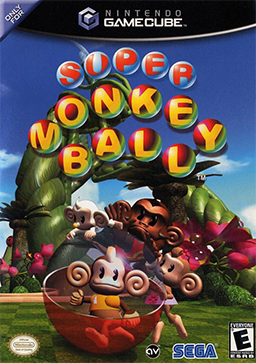
Super Monkey Ball is a 2001 platform party video game developed by Amusement Vision and published by Sega. The game debuted in Japan at the 2001 Amusement Operators Union trade show as Monkey Ball, an arcade cabinet running on Sega's NAOMI hardware and controlled with a distinctive banana-shaped analog stick. Due to the discontinuation of Sega's Dreamcast home console and the company's subsequent restructuring, an enhanced port dubbed Super Monkey Ball was released as a launch title for the GameCube in late 2001, garnering interest as Sega's first game published for a Nintendo home console.
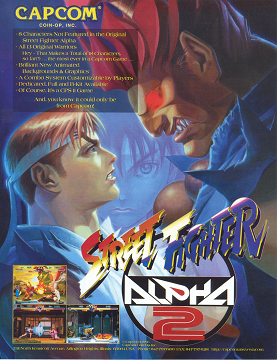
Street Fighter Alpha 2, known as Street Fighter Zero 2 in Japan, Asia, South America, and Oceania, is a 1996 fighting game originally released for the CPS II arcade hardware by Capcom. The game is a remake of the previous year's Street Fighter Alpha: Warriors' Dreams. The game features a number of improvements over the original, such as new attacks, stages, endings, and gameplay features. It was followed by Street Fighter Alpha 3.
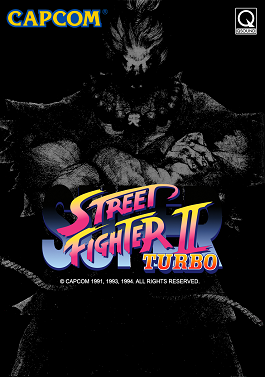
Super Street Fighter II Turbo, released in Japan as Super Street Fighter II X: Grand Master Challenge, and also known as Super Street Fighter II Turbo: The Ultimate Championship, is a fighting game released for the arcades by Capcom in Japan on February 23, 1994, in North America on February 23 and March 26, 1994 (beta) and in Europe in March 1994 (beta). It is the fifth installment in the Street Fighter II sub-series of Street Fighter games, following Super Street Fighter II: The New Challengers. Like its predecessor, it ran on the CP System II hardware.

Pete Sampras Tennis is a sports video game developed by Zeppelin Games and published by Codemasters for the Sega Genesis and Game Gear in 1994. A Master System version was cancelled in development. It was followed by Sampras Tennis 96 for the Genesis and Pete Sampras Tennis '97.

Ultimate Mortal Kombat 3 is a fighting game in the Mortal Kombat series, developed and released by Midway to arcades in 1995. It is a standalone update of 1995's earlier Mortal Kombat 3 with an altered gameplay system, additional characters like the returning favorites Reptile, Kitana, Jade and Scorpion who were missing from Mortal Kombat 3, and some new features.

Dragon Ball Z: Budokai 3, released as Dragon Ball Z3 in Japan, is a video game based on the popular anime series Dragon Ball Z and was developed by Dimps for the PlayStation 2. The game was published by Atari in North America and Australia, and Bandai in Europe and Japan. It was released on November 16, 2004 in North America through standard release and a Limited Edition release, which included a DVD featuring behind-the-scenes looks on the game's development. Europe soon saw a release on December 3, 2004. In Fall 2005, Europe obtained a new edition which included character models not available in the North American release as well as a few items and the ability to switch the voices over to Japanese. Japan later saw a release from Bandai on February 10, 2005 and also included the extras that the North American release did not have. Soon after, the Greatest Hits version in North America contained the extra features, including the ability to play with the Japanese voices.
FIFA has licensed FIFA World Cup video games since 1986, of which only a few were received positively by the critics, but given the popularity of the competition, they all did positively on the market, and the license is one of the most sought-after. Originally in the hands of U.S. Gold, Electronic Arts acquired it in 1997 and is the current holder.

Arch Rivals is a basketball video game released by Midway for arcades in 1989. Billed by Midway as "A Basket Brawl", the game features two-on-two full court basketball games in which players are encouraged to punch opposing players and steal the ball from them. Arch Rivals was the second basketball video game released by Midway, sixteen years after TV Basketball (1974). Home versions of the game were released for the Nintendo Entertainment System, Genesis/Mega Drive, and Game Gear.
The UEFA European Championship has its own video games licensed from European football's governing body, UEFA. Eight games have been released so far, with the first game released in 1992. Originally held by TecMagik, it was then held by Gremlin Interactive in 1996, EA Sports from 2000 until 2012. Konami had the rights for 2016 and 2020. EA Sports have again had the rights since 2024.
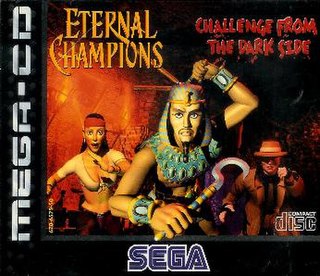
Eternal Champions: Challenge from the Dark Side is a fighting video game for the Sega CD. It was published in June 1995 in North America and during the same year in Europe, within the waning days of the platform lifespan.

Teenage Mutant Ninja Turtles: Tournament Fighters, or Teenage Mutant Hero Turtles: Tournament Fighters in Europe, is the title of three different fighting games based on the Teenage Mutant Ninja Turtles, produced by Konami for the Nintendo Entertainment System, Sega Genesis, and Super NES and released during a period between 1993 and 1994. Konami produced a different fighting game based on the franchise each featuring a differing cast of characters for the platforms. All three versions of the game were re-released as part of Teenage Mutant Ninja Turtles: The Cowabunga Collection in 2022. with online play using rollback netcode for the SNES version of the game.
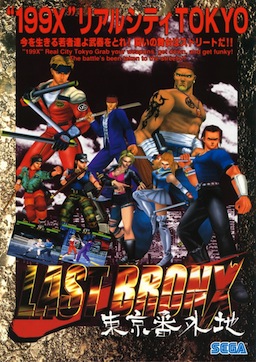
Last Bronx is a 1996 3D fighting video game developed by Sega AM3 on the Sega Model 2 mainboard. It was released in Japanese and American arcades before home versions were produced in for the contemporary Sega Saturn and Windows systems in 1997. Set in a crime-ridden Tokyo, the game follows rival street gangs who take part in a weapon fighting tournament. Last Bronx became a big hit in Japan, and it was soon novelized and serialized into comics and radio drama, and a year later Takashi Shimizu directed the direct-to-video live-action movie. On June 29, 2006, Sega released Last Bronx on PlayStation 2 as a tenth anniversary celebration.

WWF Royal Rumble is a professional wrestling video game released in 1993 for the Super NES and Sega Genesis. Like its predecessor, WWF Super WrestleMania, it is based on the World Wrestling Federation (WWF). It features a variety of match types, including the newly added Royal Rumble match. The game's roster consists of wrestlers who were top stars in the WWF at the time, and each version of the game has five exclusive playable characters.
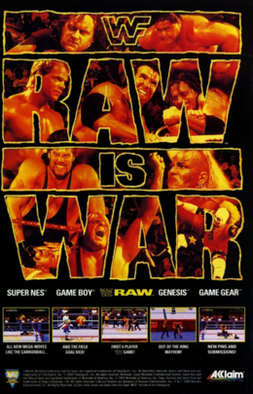
WWF Raw is a professional wrestling video game based on the television show of the same name produced by the World Wrestling Federation (WWF), released for the SNES, 32X, Mega Drive/Genesis, and Game Boy in late 1994 and early 1995 by Acclaim Entertainment. It is the sequel to the WWF Royal Rumble game that was released in 1993, and is the final part of LJN's 16-bit WWF trilogy. Players can play either One-on-One, Tag Team, Bedlam, Survivor Series, Royal Rumble, or a Raw Endurance Match. Unlike its predecessor, WWF RAW is multitap compatible.

Tekken (鉄拳) is a 1994 fighting game developed and published by Namco. It was originally released on arcades, then ported to the PlayStation home console in 1995. One of the earliest 3D polygon-based games of the genre, Tekken was Namco's answer to Virtua Fighter and was designed by Seiichi Ishii, who himself was also Virtua Fighter's designer when he worked at Sega previously. The game was developed on the purpose-built low-cost System 11 board, based on PlayStation hardware.
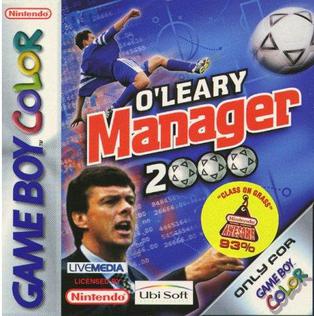
O'Leary Manager 2000 is a football player-manager game developed by LiveMedia and published by Ubi Soft released in 2000 for the Game Boy Color. The player can choose whether they want to focus on the management side of football, play the matches themselves on the game's 2D match engine, or combine the two features for a more in-depth experience. It is endorsed by Irish football manager David O'Leary, who was managing English Premier League side Leeds United at the time of the game's release. The game was released as Guy Roux Manager 2000 in France, DSF Fußball Manager in Germany, Co Adriaanse Football Manager in the Netherlands and Barça Manager 2000 in Spain.

Arnold Palmer Tournament Golf is a golf video game for the Sega Mega Drive/Genesis.


















